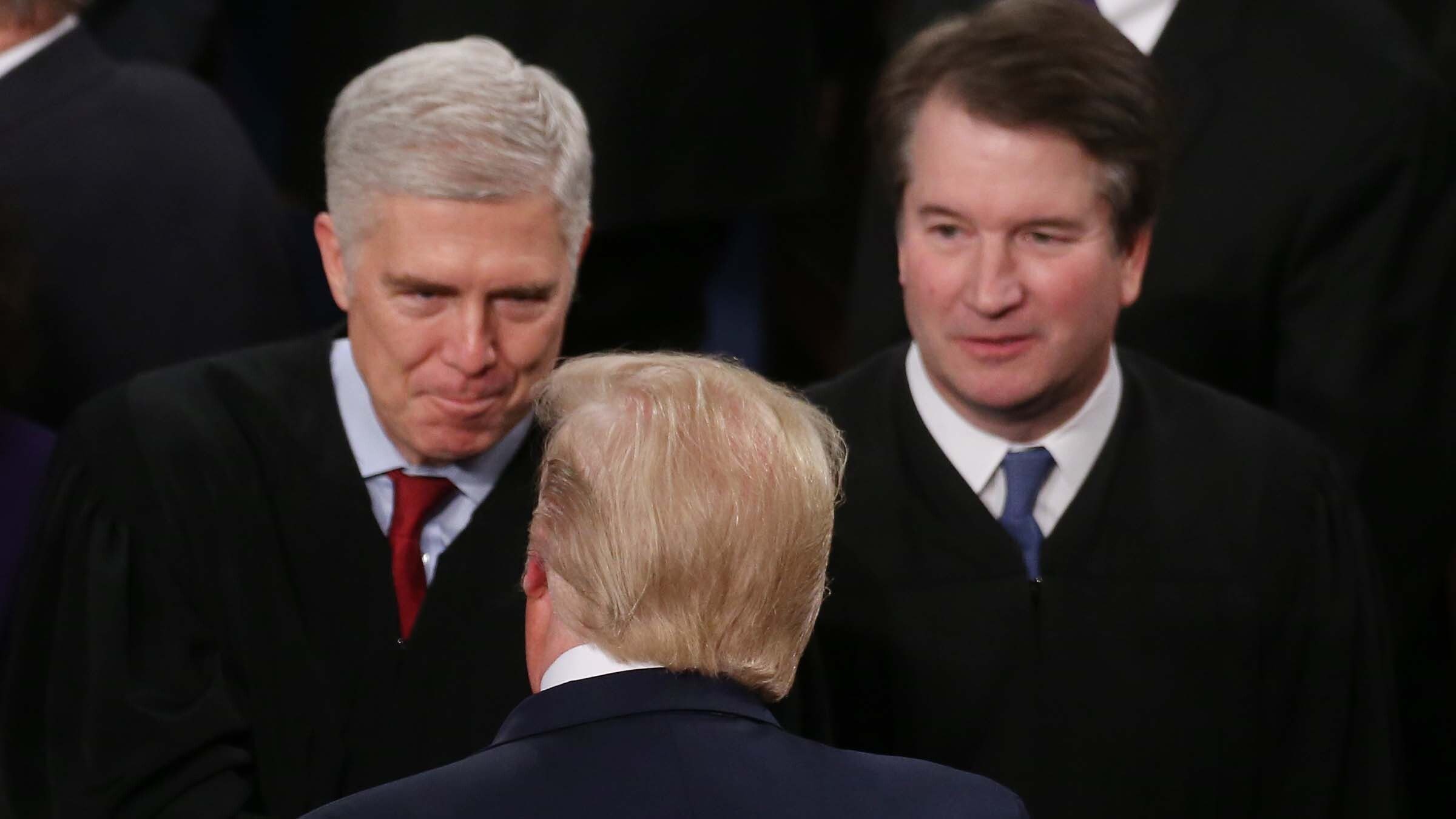On Friday, the Supreme Court issued its opinion in Whole Woman’s Health v. Jackson, a case about whether Republican lawmakers can hollow out the right to abortion care if they concoct a clever-enough scheme to do so. For the conservative justices who have spent their professional lives embedded in a movement fighting to take away the bodily autonomy of pregnant people, the answer is an enthusiastic yes.
Jackson is a challenge to Texas SB8, a ban on abortions conducted after six weeks of pregnancy. This law is an obvious violation of Roe v. Wade and Planned Parenthood v. Casey, which together protect the right to abortion care up until about the 23rd week. Over the years, the legal system has developed a pretty standard roadmap for disposing of these laws: Abortion care providers go to federal court to sue the officials charged with enforcing it. A federal judge, citing Roe and Casey, dutifully blocks the law from taking effect. The Republican politicians who championed it, bowed but not defeated, vow to try harder in their next legislative session to subject women’s bodies to the state’s control.
The novelty of SB8 lies in its method of implementation. Instead of relying on law enforcement officials to enforce the law, Texas outsourced that task to private parties: Under SB8, any random person can sue anyone who aids or abets the commission of an abortion, and collect a cash bounty of at least of $10,000 for their troubles. Texas designed this dystopian system to evade those pesky federal barriers to state anti-choice laws: With no officials to sue, Texas Republicans reasoned, clinics would have no way to stop SB8 from taking effect.
The issue in Jackson is whether there is someone—anyone, really—whom Texas abortion clinics can sue here. The clinic in Jackson named a dizzying array of defendants, hoping at least one would stick: the state court judges who would hear vigilante lawsuits; the state court clerks who would docket vigilante lawsuits; the state medical licensing officials who would discipline providers that lose vigilante lawsuits; the state attorney general, Ken Paxton; and a single guy, one Mark Lee Dickson, who might contemplate bringing a vigilante lawsuit to score an easy payday.

Getty Images
But while lawyers and judges spent months pondering these technical questions, SB8 quickly accomplished what Texas Republicans intended. After the law took effect in early September, abortions in the state fell by half; many health care providers, understandably afraid that a tidal wave of litigation would force them to close their doors, stopped conducting procedures altogether. As a result, this Rube Goldberg-esque attack on the rights of pregnant people overturned Roe in the country’s second-largest state, transforming the fifty-year-old right to abortion care into a hollow promise not worth the paper on which it’s written.
For people who hoped the Court would eventually reject this cynical evasion of the Constitution, the outcome in Jackson is not even half a loaf. The justices unanimously ruled that state court judges cannot be sued. Five conservatives, over the useless protestations of Chief Justice John Roberts, decided that clinics can’t sue state court clerks or the attorney general, either. The only parties on the hook, the Court concluded, are the medical licensing officials who might hypothetically discipline abortion providers who violate SB8 in the future.
What this means is that although legal challenges to SB8 can technically go forward, those challenges will be of little use to pregnant people. Abortion care in Texas has all but disappeared not because providers are worried about their medical licenses, but because they cannot risk getting sued into oblivion; for doctors concerned that five- or six- or seven-figure liability could bankrupt them overnight, whether their paperwork is in order is not exactly at the top of their priorities list. Allowing a husk of a lawsuit to proceed against a handful of barely-relevant defendants is like telling firefighters they can do their jobs only with whatever half-empty water bottles they have in the truck.
Allowing a husk of a lawsuit to proceed against a handful of barely-relevant defendants is like telling firefighters they can do their jobs only with whatever half-empty water bottles they have in the truck.
Even this “victory” is an illusory one, because Justice Neil Gorsuch’s opinion generously explains why those licensing officials, despite the very best efforts of Texas Republicans, aren’t quite insulated from getting pulled into federal court. It’s not that Texas can’t circumvent challenges to SB8, in other words; according to Gorsuch, it’s just that his fellow Republicans didn’t do so carefully enough this time around. The opinion is not an affirmation of Roe, let alone an affirmation of the Court’s general responsibility to safeguard whichever fundamental rights your state lawmakers don’t like. It is a detailed how-to manual that lawmakers in Texas and elsewhere can follow to make their abortion bans bulletproof.
The most ominous takeaway from Jackson is that the Court’s conservatives literally cannot wait to get rid of the right to abortion. Less than two weeks ago, the justices heard oral argument in Dobbs v. Jackson Woman’s Health Organization, which gives the conservative legal movement its best chance to overrule Roe and Casey after five decades of trying. A Court that cares even a little bit about preserving some modicum of its institutional credibility might have gone through the motions of upholding Roe for now, deciding Jackson in a way that blocks SB8 for a few months before Dobbs overturns Roe and renders the debate over SB8 irrelevant.
On the brink of winning their longest-running battle, however, the conservative justices could not even manage this exercise in delayed gratification. At this point, they are like giddy, sugar-high kids at a birthday party, pushing one another aside to see who gets to whack the piñata next, eager to collect the payoff that, thanks to an uninterrupted series of intensifying body blows, could come at any moment. The right to abortion care basically no longer exists in Texas. Sooner rather than later, it will no longer exist anywhere else.

